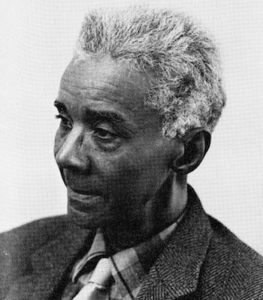
Cyril Lional James
Cyril Lionel Robert James was born on this date in 1901. He was an Afro Caribbean journalist, socialist theorist, and writer.
James was born in Trinidad and Tobago, then a British Crown colony. The son of a schoolteacher from Tunapuna, Trinidad, he was strongly influenced by his mother who was an avid reader.
James was a gifted child who, at the age of six, won a scholarship to Queens Royal College. After college, James worked as a school teacher and as a cricket reporter. During this time, he also wrote two novels, "La Divina Pastora" (1927) and "Triumph" (1929). With an interest in politics, he wrote a biography of the Trinidadian labor leader, Arthur Cipriani, "The Life of Captain Cipriani," published in 1929.
In 1932, he immigrated to England, where he reported cricket matches for the Manchester Guardian. Politically, James was a strong supporter of West Indian independence. He wrote a pamphlet, "The Case for West Indian Self-Government," published in 1933.
James moved to London, where he studied Karl Marx, Friedrich Engels, and Leon Trotsky. He initially joined the Independent Labor Party (ILP) and became chairman of its Finchley branch. He also wrote for left-wing journals such as the New Leader and Controversy. James left the ILP and formed the Revolutionary Socialist League when he became a Marxist. As a follower of Trotsky, James was highly critical of the government of Joseph Stalin and the British Communist Party.
In 1936, James published "Minty Alley," a novel based on his childhood in Trinidad. He also wrote a play about Toussaint L’ouverture, the leader of the Haitian revolution, and in 1936, Paul Robeson played the leading role in its production at the Westminster Theatre.
James published several books on politics, including "Abyssinia and the Imperialists" (1936) and "World Revolution 1917-1936" (1937). This historical account was highly critical of Stalin's 1924 pronouncement, "Socialism in One Country," and provided support for the ideas of Leon Trotsky. His study of the Haitian revolution, "The Black Jacobins," was published in 1938.
In that same year, James moved to America, where he lectured on political issues and continued to publish books about politics, including "Dialectical Materialism and the Fate of Humanity" (1947), "Notes on Dialectics" (1948), "The Revolutionary Answer to the Negro Problem in the USA" (1948), "State Capitalism and World Revolution" (1950), and "The Class Struggle" (1950).
James also wrote at length about the work of Walt Whitman and Herman Melville. But in America, his Marxist writings caught Senator Joseph McCarthy's attention and fellow right-wingers' attention; in 1953, he was threatened with deportation for having overstayed his visa by over ten years. In his attempt to remain in the USA, James, while being detained on Ellis Island, wrote a study of Herman Melville, "Mariners, Renegades, and Castaways: The Story of Herman Melville and the World We Live In," and had copies of the privately published work sent to every member of the Senate.
James lived for a while in Africa but, in 1958, returned to the West Indies. Influenced by the events of the Hungarian uprising in 1956, his book "Facing Reality" (1958) revealed disillusionment with Communism and Trotskyism. Soon after, he worked on a biography of George Padmore, and parts of the book appeared in The Nation journal.
In 1963 James published "Beyond a Boundary," a combination of autobiography and analysis of sports and politics. Other books by James include "Radical America" (1970) and "Nkrumah and the Ghana Revolution" (1977), and "Radical America" (1970).
Cyril Lionel Robert James moved back to London, where he died in May 1989.
